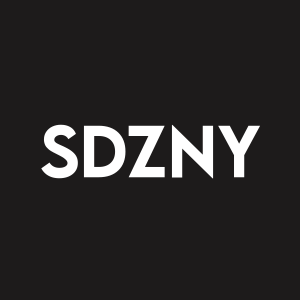Sandoz launches first and only interchangeable denosumab biosimilars in US, providing new affordable treatment options for over 10 million patients[1]
Rhea-AI Summary
Positive
- First and only FDA-approved interchangeable denosumab biosimilars in the US market
- Expands access to treatment for over 10 million potential patients
- Approved for all indications of reference medicines, offering comprehensive treatment options
- Includes established Q code and comprehensive patient support resources
- Strengthens Sandoz's position in the growing biosimilar market
Negative
- None.
News Market Reaction
On the day this news was published, SDZNY gained 1.40%, reflecting a mild positive market reaction.
Data tracked by StockTitan Argus on the day of publication.
Ad-hoc announcement pursuant to art. 53 SIX Swiss Exchange Listing Rules
MEDIA RELEASE
- WYOST® (denosumab-bbdz) and Jubbonti® (denosumab-bbdz) are first and only FDA-approved interchangeable denosumab biosimilars available in US
- Improves access for patients living with osteoporosis and cancer-related skeletal events in US and enhances US biosimilar portfolio
- Builds on established experience and leadership in oncology and immunology biosimilars
Basel, June 2, 2025 – Sandoz (SIX:SDZ/OTCQX:SDZNY), the global leader in generic and biosimilar medicines, has announced that WYOST® (denosumab-bbdz) and Jubbonti® (denosumab-bbdz) are available to patients in the US starting today. WYOST® and Jubbonti® are the first and only interchangeable FDA-approved denosumab biosimilars and are approved to treat all indications of the reference medicines XGEVA®* (denosumab) and Prolia®* (denosumab), respectively.[2,3]
This launch builds on Sandoz established leadership in biosimilars and oncology, dating back to the introduction of the first biosimilar in the US in 2015. WYOST® and Jubbonti® are key biosimilar value drivers that are integral to the Sandoz growth strategy, representing a significant step forward in advancing the Company’s ambition to be the biosimilar leader in the US.
Keren Haruvi, President Sandoz North America, said: “Denosumab is a vital medicine for conditions such as osteoporosis and cancer-related skeletal events. Providing an additional high-quality, cost-effective treatment option helps improve access and affordability for US patients.”
WYOST® and Jubbonti® have the same dosage form, route of administration, dosing regimen and presentation as the respective reference medicines. WYOST® and Jubbonti® are approved as interchangeable with the reference medicines for all indications. WYOST® and Jubbonti® will be launching with an established Q code.
Sandoz is providing comprehensive support resources for patients who are prescribed WYOST® and Jubbonti®, including reimbursement and financial support.
Claire Gill, Chief Executive Officer, Bone Health and Osteoporosis Foundation, said: “Bone loss and cancer-related skeletal complications can have a profound impact on patients’ lives, but access to effective treatments has often been impacted by cost. With the introduction of new biosimilar options, patients now have access to more treatments they need and deserve.”
Bone metastases occur when cancer cells move away from the original tumor site and into the bone, weakening its structure and often causing significant skeletal-related events (SREs) such as pain and fractures.[4] They are most common in patients with breast, prostate, lung, kidney and thyroid cancers and approximately 330,000 people in the US are living with bone metastases.[4]
Osteoporosis is a condition that develops when bone mineral density and bone mass decrease causing the bones to become thinner, weaker and more likely to break.[5] Over 10 million US adults 50 years of age or older live with osteoporosis, with over 43 million at risk due to low bone mass.[1,5] Half of all women and a quarter of all men over the age of 50 will break a bone due to osteoporosis.[6]
*XGEVA® and Prolia® are registered trademarks of Amgen Inc.
About WYOST® (denosumab-bbdz)
WYOST® 120 mg/1.7 mL (70 mg/mL) injection has been approved by the FDA as interchangeable with the reference medicine, a human monoclonal antibody designed to bind to the RANKL protein, an activator of osteoclasts (cells involved in breaking down bone tissue).[3,7] WYOST® is indicated in the US to prevent SREs in patients with multiple myeloma and in patients with bone metastases from solid tumors, to treat adults and skeletally mature adolescents with giant cell tumor of bone that is unresectable or where surgical resection is likely to result in severe morbidity, and to treat hypercalcemia of malignancy refractory to bisphosphonate therapy.[7]
SELECT IMPORTANT SAFETY INFORMATION
CONTRAINDICATIONS
Hypocalcemia and known clinically significant hypersensitivity to denosumab products.
WARNINGS AND PRECAUTIONS
Same Active Ingredient: Patients receiving Wyost should not receive other denosumab products concomitantly. Hypersensitivity reactions including anaphylaxis may occur. Discontinue permanently if a clinically significant reaction occurs. Hypocalcemia: Denosumab products can cause severe symptomatic hypocalcemia. Fatal cases have been reported with denosumab products use. Correct hypocalcemia prior to initiating Wyost. Monitor calcium levels during therapy, especially in the first weeks of initiating therapy, and adequately supplement all patients with calcium and vitamin D. Osteonecrosis of the jaw (ONJ) has been reported in patients receiving denosumab products. Perform an oral examination prior to starting Wyost. Monitor for symptoms. Avoid invasive dental procedures during treatment with Wyost. Atypical femoral fracture: Evaluate patients with thigh or groin pain to rule out a femoral fracture. Hypercalcemia Following Treatment Discontinuation in Patients with Giant Cell Tumor of Bone and in Patients with Growing Skeletons: Monitor patients for signs and symptoms of hypercalcemia and manage as clinically appropriate. Multiple Vertebral Fractures (MVF) Following Treatment Discontinuation: When Wyost treatment is discontinued, evaluate the individual patient’s risk for vertebral fractures. Embryo-Fetal Toxicity: Can cause fetal harm. Advise females of reproductive potential of potential risk to the fetus and to use effective contraception.
ADVERSE REACTIONS
Bone Metastasis from Solid Tumors: Most common adverse reactions (≥
USE IN SPECIFIC POPULATIONS
Pediatric patients: Recommended only for treatment of skeletally mature adolescents with giant cell tumor of bone. Renal impairment: Patients with creatinine clearance less than 30 mL/min or receiving dialysis are at risk for hypocalcemia. Adequately supplement with calcium and vitamin D.
This is not the complete list of all the safety information for Wyost. Please click to see full Prescribing Information for Wyost.
About Jubbonti® (denosumab-bbdz)
Jubbonti® 60 mg/1 mL injection has been approved by the FDA as interchangeable with the reference medicine, a human monoclonal antibody designed to bind to the RANKL protein, an activator of osteoclasts (cells involved in breaking down bone tissue).[2,8] Jubbonti® is indicated in the US to treat postmenopausal women with osteoporosis at high risk for fracture, to increase bone mass in men with osteoporosis at high risk for fracture, to treat glucocorticoid-induced osteoporosis in men and women at high risk for fracture, to increase bone mass in men at high risk for fracture receiving androgen deprivation therapy for nonmetastatic prostate cancer, and to increase bone mass in women at high risk for fracture receiving adjuvant aromatase inhibitor therapy for breast cancer.[8]
SELECT IMPORTANT SAFETY INFORMATION
| WARNING: SEVERE HYPOCALCEMIA IN PATIENTS WITH ADVANCED KIDNEY DISEASE See full prescribing information for complete boxed warning. | |
| • | Patients with advanced chronic kidney disease are at risk of severe hypocalcemia following denosumab products administration. Severe hypocalcemia requiring hospitalization, life-threatening events and fatal cases have been reported. |
| • | The presence of chronic kidney disease-mineral bone disorder (CKD-MBD) markedly increases the risk of hypocalcemia. |
| • | Prior to initiating Jubbonti in patients with advanced chronic kidney disease, evaluate for the presence of CKD-MBD. Treatment with Jubbonti in these patients should be supervised by a healthcare provider with expertise in the diagnosis and management of CKD-MBD. |
CONTRAINDICATIONS
Hypocalcemia; pregnancy; and known hypersensitivity to denosumab products.
WARNINGS AND PRECAUTIONS
Hypocalcemia: Pre-existing hypocalcemia must be corrected before initiating Jubbonti. Adequately supplement all patients with calcium and vitamin D. Concomitant use of calcimimetic drugs may also worsen hypocalcemia risk. Evaluate for presence of chronic kidney disease mineral-bone disorder. Monitor serum calcium. Same Active Ingredient: Patients receiving Jubbonti should not receive other denosumab products concomitantly. Hypersensitivity including anaphylactic reactions may occur. Discontinue permanently if a clinically significant reaction occurs. Osteonecrosis of the jaw (ONJ): Has been reported with denosumab products. Monitor for symptoms. Atypical femoral fractures: Have been reported. Evaluate patients with thigh or groin pain to rule out a femoral fracture. Multiple vertebral fractures have been reported following treatment discontinuation. Patients should be transitioned to another antiresorptive agent if Jubbonti is discontinued. Serious infections including skin infections: May occur, including those leading to hospitalization. Advise patients to seek prompt medical attention if they develop signs or symptoms of infection, including cellulitis. Dermatologic reactions: Dermatitis, rashes, and eczema have been reported. Consider discontinuing Jubbonti if severe symptoms develop. Severe bone, joint, muscle pain may occur. Discontinue use if severe symptoms develop. Suppression of bone turnover: Significant suppression has been demonstrated. Monitor for consequences of bone over-suppression.
ADVERSE REACTIONS
Postmenopausal osteoporosis: Most common adverse reactions (>
USE IN SPECIFIC POPULATIONS
Pregnant women and females of reproductive potential: Denosumab products may cause fetal harm when administered to pregnant women. Advise females of reproductive potential to use effective contraception during therapy, and for at least 5 months after the last dose of Jubbonti. Pediatric patients: Jubbonti is not approved for use in pediatric patients. Renal impairment: No dose adjustment is necessary in patients with renal impairment. Patients with advanced chronic kidney disease (eGFR <30 mL/min/1.73 m2), including dialysis-dependent patients, are at greater risk of severe hypocalcemia. The presence of underlying chronic kidney disease-mineral bone disorder markedly increases the risk of hypocalcemia.
This is not the complete list of all the safety information for Jubbonti. Please click to see full Prescribing Information for Jubbonti.
DISCLAIMER
This Media Release contains forward-looking statements, which offer no guarantee with regard to future performance. These statements are made on the basis of management’s views and assumptions regarding future events and business performance at the time the statements are made. They are subject to risks and uncertainties including, but not confined to, future global economic conditions, exchange rates, legal provisions, market conditions, activities by competitors and other factors outside of the control of Sandoz. Should one or more of these risks or uncertainties materialize or should underlying assumptions prove incorrect, actual outcomes may vary materially from those forecasted or expected. Each forward-looking statement speaks only as of the date of the particular statement, and Sandoz undertakes no obligation to publicly revise any forward-looking statements, except as required by law.
REFERENCES
[1] Sarafrazi N, Wambogo EA, Shepherd JA. Osteoporosis or Low Bone Mass in Older Adults: United States, 2017–2018. Centers for Disease Control and Prevention. 2021;405. Available at: https://www.cdc.gov/nchs/products/databriefs/db405.htm [Last accessed: June 2025]
[2] Food and Drug Administration. Prolia® (Ustekinumab): Medication Guide. Available at: https://www.accessdata.fda.gov/drugsatfda_docs/label/2024/125320s213lbl.pdf [Last accessed: June 2025]
[3] Food and Drug Administration. XGEVA® (Ustekinumab): Medication Guide. Available at: https://www.accessdata.fda.gov/drugsatfda_docs/label/2010/125320s0000lbl.pdf [Last accessed: June 2025]
[4] Moffitt Cancer Center. Bone Metastasis. Available at: https://www.moffitt.org/cancers/bone-metastasis/ [Last accessed: June 2025]
[5] Food and Drug Administration. Osteoporosis. Available at: https://www.fda.gov/consumers/womens-health-topics/osteoporosis [Last accessed: June 2025]
[6] American Academy of Orthopaedic Surgeons. Osteoporosis. Available at: https://orthoinfo.aaos.org/en/diseases--conditions/osteoporosis/ [Last accessed: June 2025]
[7] WYOST®. Prescribing Information. Available at: https://www.accessdata.fda.gov/drugsatfda_docs/label/2024/761362s000lbl.pdf [Last accessed: June 2025]
[8] Jubbonti®. Prescribing Information. Available at: https://www.accessdata.fda.gov/drugsatfda_docs/label/2024/761362s000lbl.pdf [Last accessed: June 2025]
ABOUT SANDOZ
Sandoz (SIX: SDZ; OTCQX: SDZNY) is the global leader in generic and biosimilar medicines, with a growth strategy driven by its Purpose: pioneering access for patients. More than 20,000 people of 100 nationalities work together to ensure 900 million patient treatments are provided by Sandoz, generating substantial global healthcare savings and an even larger social impact. Its leading portfolio of approximately 1,300 products addresses diseases from the common cold to cancer. Headquartered in Basel, Switzerland, Sandoz traces its heritage back to 1886. Its history of breakthroughs includes Calcium Sandoz in 1929, the world’s first oral penicillin in 1951, and the world’s first biosimilar in 2006. In 2024, Sandoz recorded net sales of USD 10.4 billion.
| CONTACTS | |
| Global Media Relations contacts | Investor Relations contacts |
| Global.MediaRelations@sandoz.com | Investor.Relations@sandoz.com |
| Alex Kalomparis +41 792 790285 | Craig Marks +44 7818 942 383 |
| Joerg E. Allgaeuer +49 171 838 4838 | Tamara Hackl +41 79 790 5217 |
| US Media Relations contacts | |
| Vicki Crafton +1 201 213 6338 | |
| Jeanne LaCour +1 609 955 2339 |
Attachment










